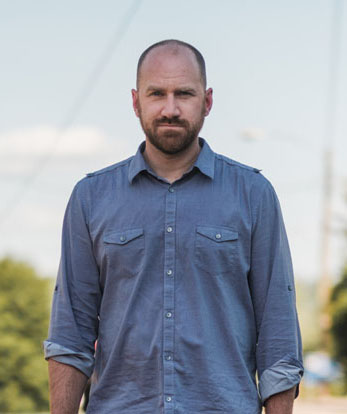Matthew Slaats is a 5th year PhD Candidate in the department of Architecture and Urban Planning in the Constructed Environment Program. His dissertation research is focused on working with grassroots, Black led social movements to recognize the ways they imagine and build new economic and political systems in response to long term disinvestment and disenfranchisement. He is working with Public Housing Association of Residents in Charlottesville so that residents can share the 40 year history of the affordable housing movement in the aftermath of urban renewal. Matthew has been a leader in participatory democracy in Virginia though projects like Becville, a civic arts initiative that put public funds in the hands of community residents.
Matthew was a PhD+ intern at the Highlander Research and Education Center in summer 2021.
Q. What are your career aspirations?
Recognizing the impact of the covid-19 pandemic and the long history of racial injustice, my career aspirations are focused on supporting community-led development and participatory democracy to realize more resilient and just communities. I can see this interest taking multiple forms either through pursuing an academic/research role, working in the philanthropic sector, or starting the VA Center for Economic Democracy.
Q. Please summarize your internship experience.
I proposed my own internship under the PhD+ internship paths for several reasons. Having long admired the role that the Highlander Center has played in popular education and community organizing in the South, I wanted to build a relationship with them that went deeper than simply attending one of their trainings and events. With some shared interests in supporting economic justice, I also knew that I could learn from their approach and vision for working with communities of color in the South. The first hand perspective on how their work takes place and these relationships will directly impact my own future work.
I contributed to an effort that the Highlander Center has been organizing to establish a network of grassroots organizations committed to realizing a solidarity economy network in the South. A specific piece of this is focused on the worker cooperative ecosystem has had a long history, but has been re-emerging in the last 10 years. So, we worked together to identify a series of Black led worker cooperative efforts, hear their stories, and better understand their needs. This will then support further curriculum development and trainings.
Q. What professional skills did you develop during this internship?
I definitely developed communication, organizing, popular education training processes, participatory action research methods, leadership, and networking skills through this internship.
Q. How has this internship assisted in your career development and planning?
As my future career hopes to parallel some of the work that Highlander has been doing, the internship allowed me to better understand the dynamics of the community organizing work that is taking place in the South. It allowed me to create relationships with other organizations and projects, which will be growing in the coming years. It also brought forward questions about what roles these organizations play in a broader ecosystem of grassroots led social change and how new economic ideas take share.
Q. What advice would you give your peers on utilizing PhD Plus internships for career development?
My internship has solidified my focus for what I want to do after completing my PhD work. Because of the mentors I had and their willingness to let me lead the work I was doing, I feel like I have a platform to build upon that is rooted in the immense amount of work that is taking place in the South. It also grounded my PhD work more as I thought about how that research connects to the work going on in the world and the impact that I want to make in that world.

